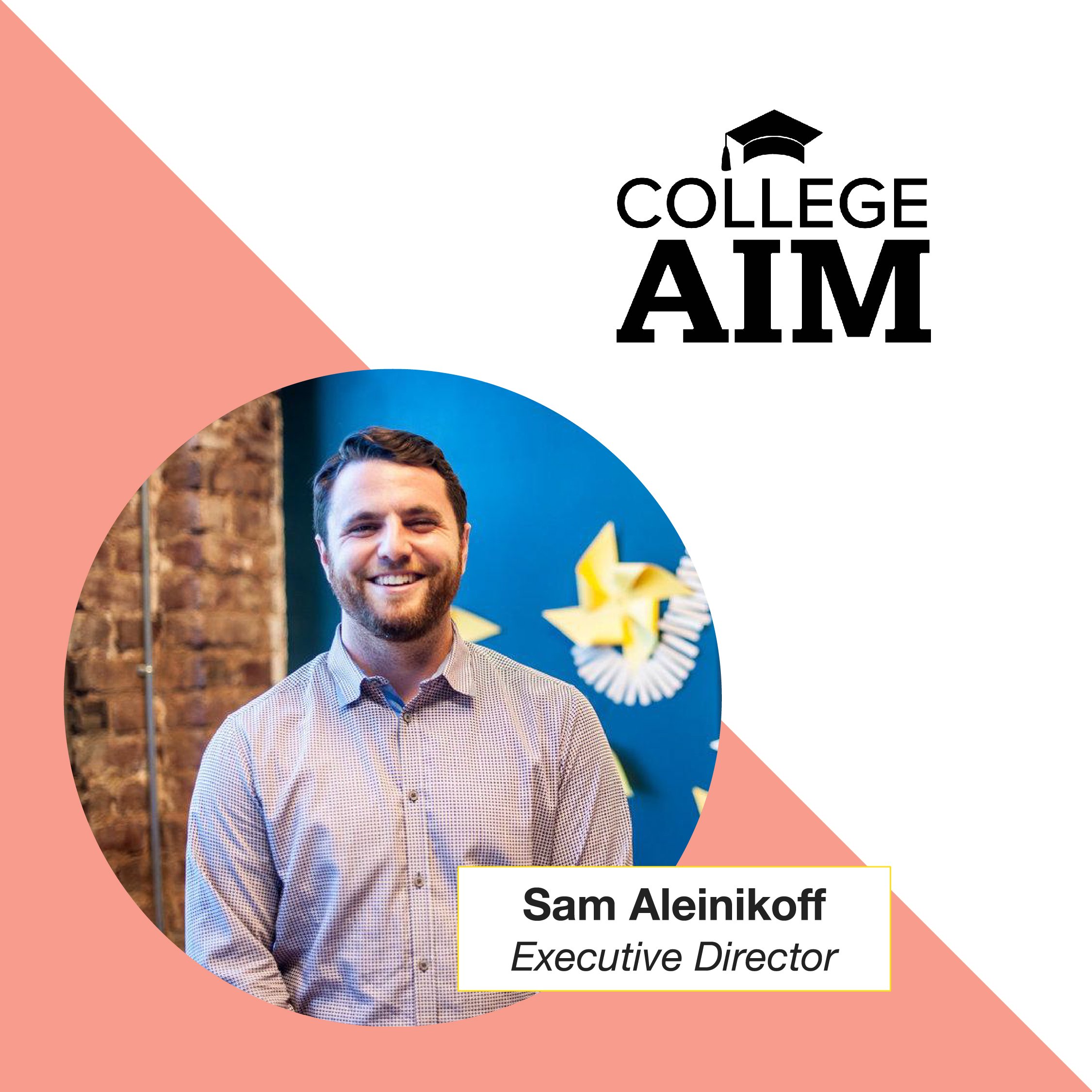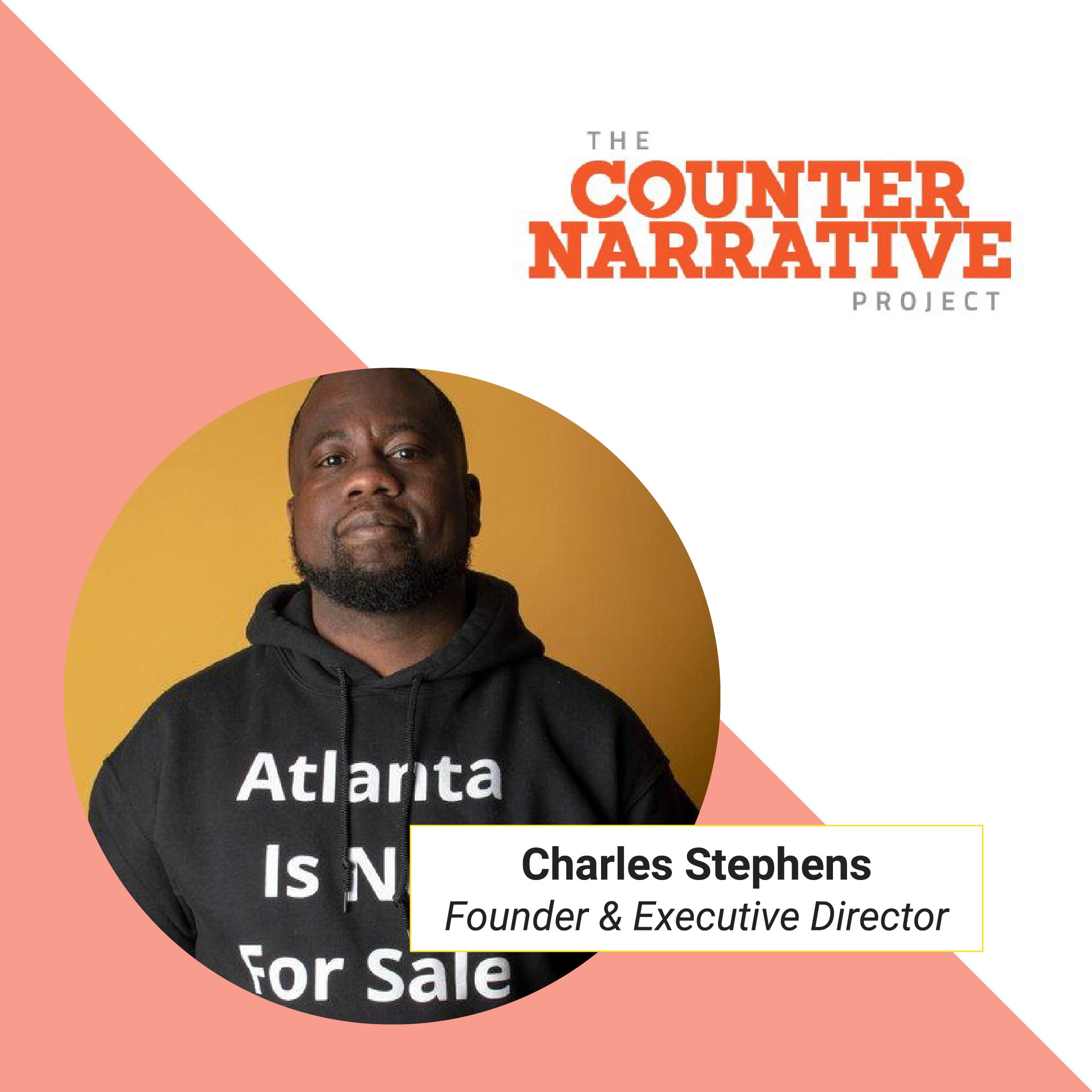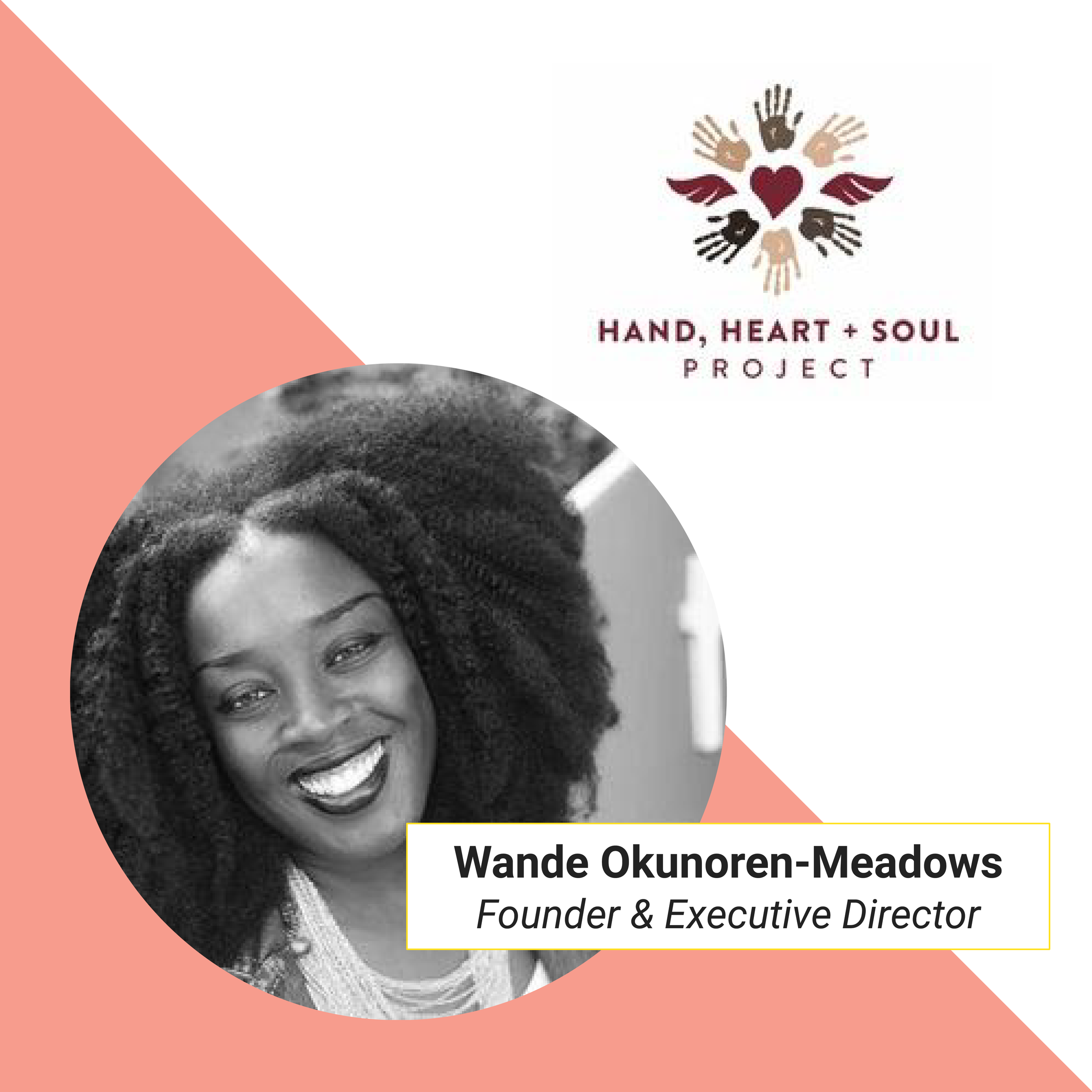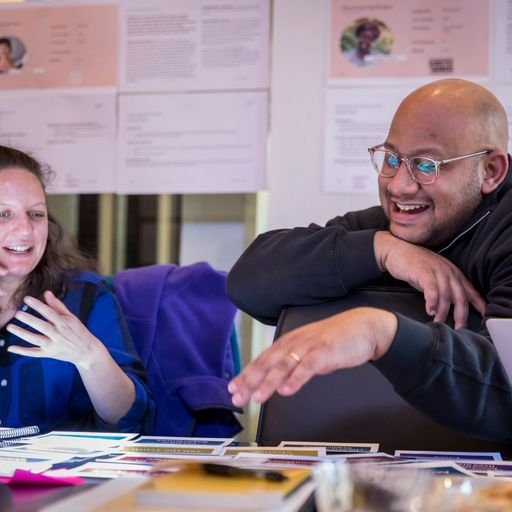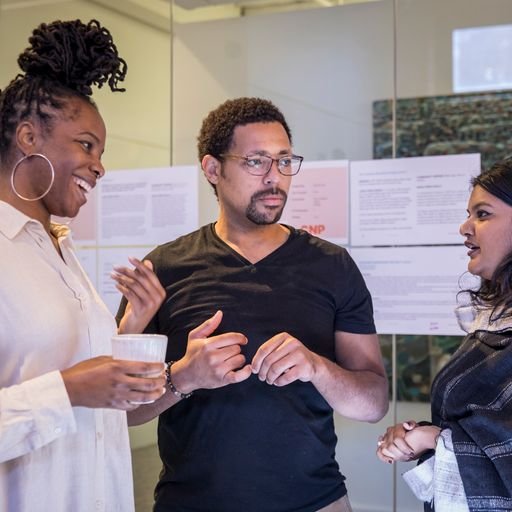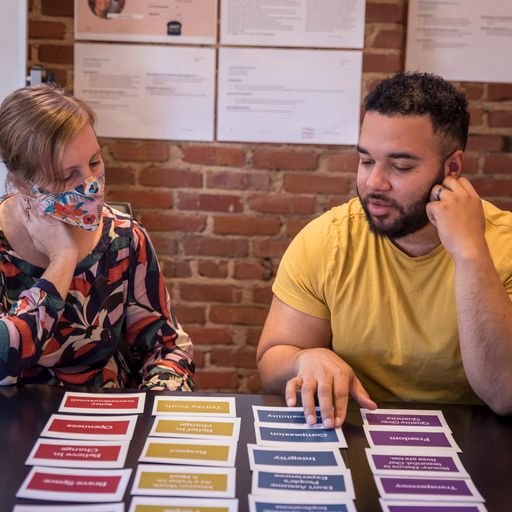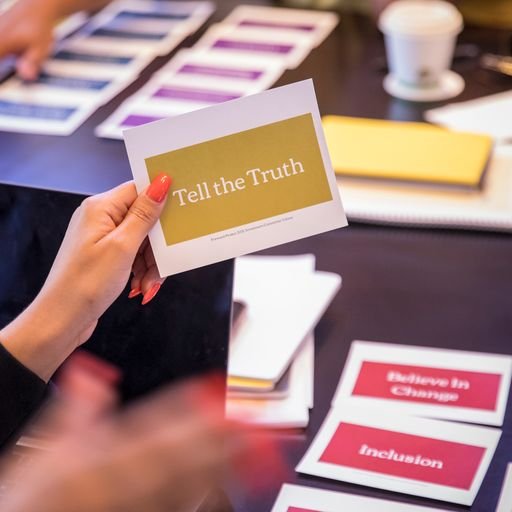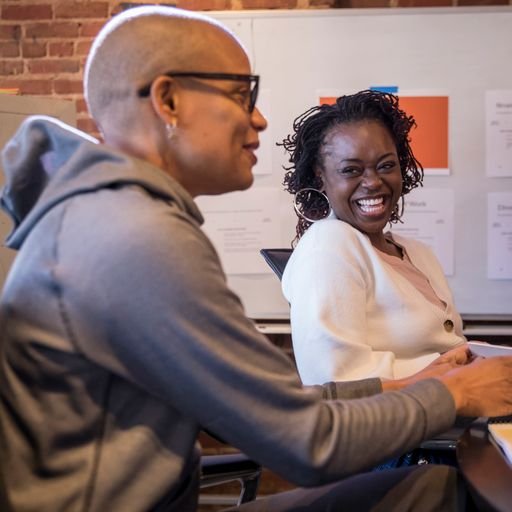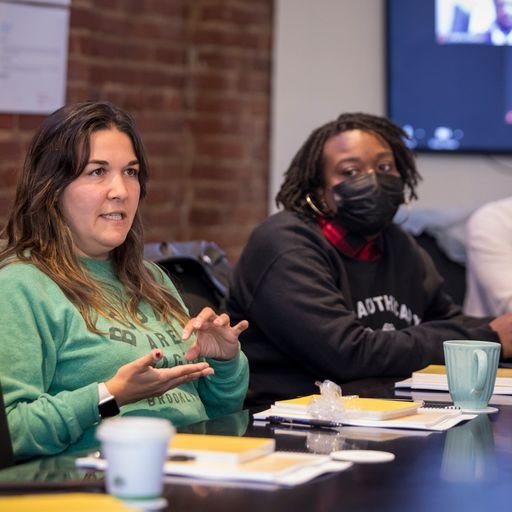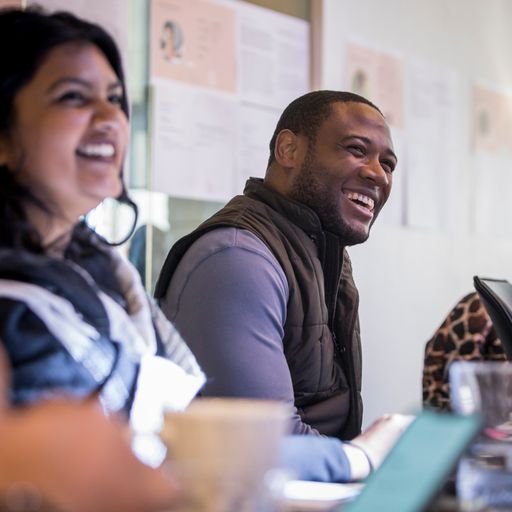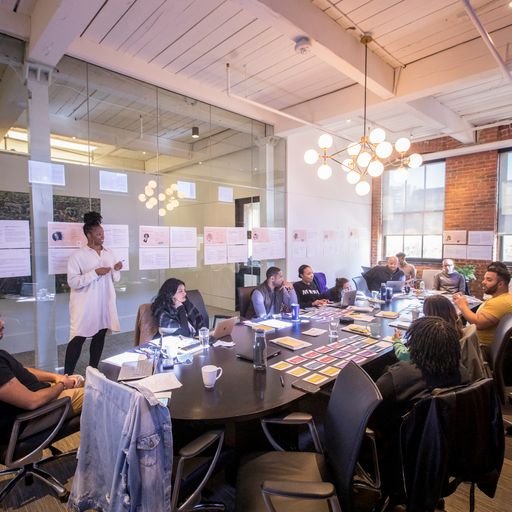Starsha Valentine on finding her sweet spot
I, like so many other Black leaders, bring my whole lived experience to my work. That perspective has allowed me to connect with some of the most dynamic Black-led organizations in the Mid Atlantic region.
“I am fully committed to ensuring that we support an inclusive sector with leaders representing the full spectrum of the rich communities they serve.”
- Starsha Valentine
In 2016 my very first consulting client asked me “Why did you choose nonprofit management as your career?” This question came after I gave a passionate presentation on fundraising planning to a room full of his wide-eyed board members. Despite the simplicity of my presentation, my enthusiasm for the process of building organizational capacity was likely surprising and frankly…unusual. After a thoughtful pause, my response was “Because there aren’t many people that look like me in nonprofit leadership and this is my sweet spot.”
Throughout my career I have routinely been the only Black woman in the room. I’ve worked with organizations where diversity and inclusion stopped at the front door and senior leadership resembled traditional Fortune 500 CEOs rather than the communities they served. I’ve attended numerous conferences and trainings showcasing “best practices” that only work for large, well resourced organizations with huge budgets and homogenous leadership. Rarely did I see the dynamic emergent leadership models that leaders of color were using to support their constituencies.
In recent years, the sector has taken steps to build more representative leadership, however, according to the Urban Institute’s Nonprofit Trends and Impacts 2021, only 21 percent of nonprofit executive directors and board chairs are people of color. Moreover, Black or African Americans represent only 8 percent of all Business Management consultants in the U.S. These statistics are why I’ve dedicated my career to supporting the nonprofit sector and serving as a consultant to community-based organizations. I, like so many other Black leaders, bring my whole lived experience to my work. That perspective has allowed me to connect with some of the most dynamic Black-led organizations in the Mid Atlantic region.
Valentine Group Consulting was created as an extension of my personal mission to bridge the capacity gap for Black-led and grassroots organizations in Washington, D.C. In 2020, our evolution drew us to partner with Purpose Possible. PP’s commitment to its Core Values, particularly an “Inclusive + Empowered Team” are in direct alignment with my mission to help build impactful organizations that create a more resilient, equitable world. Our merger with Purpose Possible further fosters our shared vision for connecting people with purpose and will allow us to deepen our footprint while also building the sustainability of the sector.
Together with the firm’s founding partners, Susannah Darrow and Laura Moody, I am committed to empowering mission-driven organizations to overcome the roadblocks that prevent them from making their purpose possible. I am also fully committed to ensuring that we support an inclusive sector with leaders representing the full spectrum of the rich communities they serve. I am delighted to join the PP team and look forward to the next phase of our journey!
Forward Project Awardees Announced
Purpose Possible joins Mailchimp in announcing the 3 Forward Project Awardees for 2022
In partnership with Mailchimp, we're investing in the unrestricted growth of 15 Atlanta‑based for‑profit and not‑for‑profit organizations over the next three years.
Purpose Possible and Mailchimp first began our partnership in 2019. After multiple conversations regarding the importance of unrestricted funding paired with the staff to support sustainable ongoing funding, we piloted Power to Grow, the initial manifestation of what is now Forward Project. The program supported Atlanta Bicycle Coalition and re:imagine/ATL and we saw the level of impact a program like this was able to have.
One thing that was missing was an opportunity for the greater community (the communities being impacted by these social entrepreneurs) to guide the process and select organizations they felt would have the greatest impact. Tiffany Curtis and her team at Indwell Collective shepherded a group of community leaders - from nonprofit organizations to community organizers to small business owners - to design and select this year's awardees.
Last week, Mailchimp announced the winners of the 2021 Forward Project––a $750,000 grant program that helps a cohort of traditionally overlooked social enterprises accelerate their community impact work in metro-Atlanta over the next three years.
The three awardee organizations, College AIM, The Counter Narrative Project, and the Hand Heart and Soul Project / Little Ones Learning Center, will each receive $200,000 in unrestricted grants to be paid out over the next three years as well as $25,000 in customized consulting services from Purpose Possible. Twelve additional finalist organizations will also receive grants ranging from $5,000-$11,000.
Purpose Possible will work with each awardee to build capacity in fundraising, business development, hiring, communications, and more. In addition to crafting bespoke service offerings alongside each of the awardees, the firm is also contributing $25,000 in pro bono services to one of the 12 finalists - Southern Fried Queer Pride. This contribution continues the firm's commitment to providing pro bono services for Black-led arts organizations in Atlanta. In 2020, Purpose Possible provided gratis grant writing services to Soul Food Cypher, T. Lang Dance, and Atlanta Black Theatre Festival -- each of whom was awarded their very first Metro Atlanta Arts Fund Grant.
Often philanthropic grants come with constraints on how the money can be used, but Forward Project funds are unrestricted. “Social enterprises cannot exist without operating capital, plain and simple,” says Susannah Darrow Co-Founder of Purpose Possible. “That's why it was so important that the awardees are empowered to spend as they choose to best support the current needs and growth of their organizations.” We can’t wait to get started in 2022!
MORE ABOUT THE AWARDEES
Awardee organizations to receive $200,000 each (to be distributed over 3 years)
College AIM
College AIM envisions a day when every student in Greater Atlanta can equally access and achieve postsecondary success. Founded in 2013 by Sam Aleinikoff, College AIM’s programming has helped more than 700 DeKalb County students explore post-secondary options through workshops, college visits, and 1-to-1 counseling. 83% of those students have continued on to four-year, two-year, and technical colleges.
College AIM will use the new investment to place more high-quality college access professionals in their partner schools and advocate for a more equitable postsecondary landscape.
Counter Narrative Project
Founded by Charles Stephens in 2014, the Counter Narrative Project works to realize an Atlanta where Black gay men and the broader Black LGBTQ community, have greater acceptance in their communities. They advocate for policy change to reduce the prevalence and stigma of HIV. CNP also works to shift the cultural narrative by pushing for more visible and responsible media coverage of Black LGBTQ people. In 2021, they were nominated for a GLAAD Media Award for their digital magazine, The Reckoning, which focuses on Atlanta’s Black LGBTQ+ community.
CNP will invest the Forward Project grant in their digital mobilization strategy and develop content that fights stigma while strengthening their capacity for fundraising.
Hand, Heart and Soul Project & Little Ones Learning Center
Hand, Heart and Soul Project & Little Ones Learning Center have forged an innovative partnership between a for-profit and non-profit to help strengthen food security by bringing fresh, nutrient-dense to families also seeking childcare. Together, they’ll build a community-based corner market, with fresh produce and e-commerce equipped for SNAP benefits. They’re also creating a mobile farm stand to bring fresh food directly to families.
The partnership, led by HHSP co-creator Wande Okunoren-Meadows, will leverage the Forward Project grant to open a new learning center in Clayton County that provides holistic programs focused on health, education, wellness, and nutrition.
FINALISTS
Finalist organizations to receive grants ranging from $5,000-$11,000 (awarded immediately)
Ballethnic Dance Company
Clarkston Community Health Center
COR, Inc.
Friendship Center
Helping Empower Youth
Just Bakery of Atlanta
Our Village United
PushPush Arts
Southern Fried Queer Pride
The Come Up Project
Village Micro Fund
We Love BuHi
ABOUT THE SUBMISSION AND SELECTION PROCESS
The Forward Project welcomed applications from early- and growth-stage ventures as well as more established organizations making a significant pivot in their work. An investment committee comprised of 14 metro-Atlanta artists, small business owners, and non-profit leaders collaborated over the last year to develop the scope of the program and select awardees. Mailchimp partnered with Indwell Collaborative to design and facilitate a democratic selection process.
We are deeply honored and grateful to have the opportunity to work alongside Josh Penny at Mailchimp and Indwell Collective to bring this program to life.
Forward Project 2021
Community Investment Team Deliberations
Purpose Possible 2021 Gift to Give Back Guide
It's time for our annual Holiday Gift to Give Back Guide! By purchasing any of these items/experiences, you're not only giving a unique, local gift, you're also providing vital funding to a local nonprofit organization. Gift to Give Back!
Artist Edition Viewfinder
This year's Auction Artist Edition Viewfinder features reels by ART PAPERS magazine cover artists Dawit L. Petros, Daniel Rich, and Jill Frank.
A Foraged Fruit Cookbook
Concrete Jungle: A Foraged Fruit Cookbook tells the story of a season of fruit in our great city and state, featuring over 40 recipes for 14 varieties of forageable fruit, flower and nut from chefs, clients, volunteers and friends as well as beautiful photographs from 20 talented photographers. Where else can you find a recipe for Kudzu Lemonade (page 74), Flying Dragon Limoncello (page 109), and Mulberry Sorbet (page 18) in one place? That's right: nowhere else. Don't even look.
MINT T-shirt
Black t-shirt with white print featuring the gallery’s name, this item features a “pay what you can” sliding scale.
Build a Treehouse Kit
Build a Treehouse blocks transform into a classic treehouse. Don't like how it looks? Simply take it apart and rebuild! Includes a swing, spiral stairs, crane, and pulley! - From Museum of Design Atlanta
Seasonal Cookbook
Just as these recipes celebrate the ephemeral ingredients of each season, these books serve as portraits of our growing community. We are all tied together by the food we cook and eat, and every recipe in our book tells a unique story about its contributor. We hope that you enjoy reading, collecting, and cooking from these books, and that you’ll share your experiences cooking seasonally, too.
The books are available to purchase for $12 at the market info booth at all of our farmers markets. – Community Farmers Markets
Kenny the Coffee Mug
Keep your coffee close and Kenny closer with this cute new mug from Plywood People.
WILDFLOWERS Painting by Sharon Weiss
WILDFLOWERS bursting with color in this Impressionistic rendering of multiple types of flowers.
This is just one of the many paintings and works of art available from the Dunwoody Nature Center’s Art Market.
I bike ATL T-shirt
Show your bike pride and support the Atlanta Bicycle Coalition with this classic tee. Pre-shrunk cotton features zero side seams, and double-needle stitched sleeves gives your wardrobe the upgrade it deserves.
Make it stand out
A whimsical, fun, and modern interpretation on the cuckoo clock that’s customizable! Select from 12 bird songs, each recorded from nature, from the blackbird to the oriole, and choose the color of bird and pendulum to coordinate with your decor. - From Museum of Design Atlanta
The 2021 Burnaway Reader
Across three thematic sections and two artist projects, Burnaway’s 2021 Reader, Treasure looks at cultural memory, myth, and the way they have shaped our South. The first section, Word of Mouth, explores the oral traditions and patterns of language that have shaped cultural imaginings of the U.S. South, extending into music, poetry, legends, and audio archives. Nodes and Networks maps the physical and digital systems of people and information that define, divide, and parse our cultural categories, with a particular emphasis on rural queer spaces and radio waves. The final section, Belief and Fiction, demonstrates how we create spirituality and make new worlds through stories. – from Burnaway
Symphony Tickets
The merry overture to the Barber of Seville provides the perfect opening for our concert season. This early 19th Century piece has endured as a popular favorite with its fast-moving strings, intriguing winds, and changing tempos.
Four wind soloists will shine with Concerto Provencal from Venezuelan-born French composer, Reynaldo Hahn. Written in 1945 near the end of his career the music is sunny, optimistic, and distinguished by the melodious flow and Romantic flair for which Hahn is known. – From the Coastal Symphony of Georgia, January 24, 2022
Counter Narrative Project Mug
You can grab this mug and a variety of other t-shirts and hoodies at Counter Narrative’s partner shop, Burre Lane.
Gift Membership to Decatur Makers
Decatur Makers offers a variety of monthly and annual memberships for both individuals and families. Kids 11+ years old can become members under a Student Membership and kids of all ages can visit as guests!
Memberships include:
• A key fob with 24/7/365 makerspace access.
• Access to our equipment and tools AND our amazingly creative community.
• Free or discounted classes, workshops, and events.
• And more!
Necklace with Grey Stones & Aqua Pendant
The Friendship Center’s online store features a variety of handmade artwork and crafts, from prints to necklaces to candle holders.
GPDC Embroidered Hat
This Port and Company cap has buckram lining in the crown, which makes for perfect embroidery and ensures a classic structured crown that keeps its shape. One size fits most and with velcro closure you can adjust the fit with ease. Place your custom embroidered logo on any of the excellent color options. – from the Georgia Public Defender Concil
Penni Peek-A-Boo
The cutest GSGATL Plush bear!
Holden On Education DVD License
Holden Layfield helps audiences through his harrowing tale in this film set in the early 1990s. After succumbing to a secret battle with mental illness, 17-year old Holden devolves from a gregarious, small-town Georgian football player to a lost, self-medicating prophet. This important film portrays the complexity of mental illness and suicide in teens, offers insight to prevention, and opens the door to conversation about this difficult but critical community concern. —IMDB
Ha! T-shirt
You can either buy a Ha! t-shirt for yourself or purchase a HA! shirt for our Humorologists to hand deliver to a patient at CHOA!
Water Bottle
This 17-ounce, double-walled stainless steel water bottle is perfect for your daily outings. It will keep your drink of choice hot or cold for hours. It also features an odor- and leak-proof cap. Throw it in your car's cup holder on your way to work, take it with you on hikes, or toss it in your bag for any time you get thirsty. – Leap Year
“Nourish Yourself” Blanket
This is part of our first ever merch drop from a limited collection and 100% of the sales from the Fundraiser Merch Collection goes to our campaign to buy land. Featuring icons with a nod to our Caribbean heritage: plantain, mango and bird of paradise brightly designed to uplift and nourish your spirit every time you wear it. Take this light blanket to the beach, picnic or use as a throw! Size is 38" x 81 - From Nourish Botanica
Pebble Tossers Logo Shirt
Start your own ripple and proudly wear our gear when you volunteer, go to school or work! Choose your favorite tee color and style and make it your own.
Persian Rugs
A classic Persian rug hand knotted in the city of Kashan. This one and more available from the Persian Cultural Center.
College Funding Toolkit
This toolkit helps low-income students secure resources to pursue higher education opportunities without debt, and, thus, create a healthier financial aid culture. – From Scholarship Academy
ALEX Sticker
The Atlanta Science Festival mascot, ALEX, wants to stick with you. Slap our 3" sticker on your water bottle, laptop, car window, or trapper keeper.
Moisture Management Workshop
Southface experts present fundamentals of moisture flow within a house. Topics include an overview of the science behind moisture flow, best practices for managing bulk moisture, and proper sheathing installation.
Upon successful completion of this course and exam, participants will be able to define and identify best practices for controlling bulk moisture, define and explain the role of psychometrics, and identify best practices for installing weather barriers and drainage retrofits. – From Southface
Tribute Tree Program
Woodlands Garden’s Tribute Tree program offers a unique and lasting way to recognize the family, friends, and events that have touched our lives while also supporting the canopy of the Garden. – From Woodlands Garden
Brer Rabbit Tales CD
Enjoy the timeless tales of Brer Rabbit any time you like with this 10 track CD, featuring stories like The Briar Patch, Brer Fox Shingles his Roof, and the unforgettable Wonderful Tar Baby. These Joel Chandler Harris stories are read by Stephen Allman, accompanied by the music of Paul Curreri. Show your friends that you are comfortable with legacy technology and that you have a CD player of your very own. – From The Wren’s Nest
A farewell for now from Melissa Brogdon
Since moving to Atlanta in 2013, I have been inspired by the power of philanthropy in our city. My work has given me many gifts, some in the form of colleagues who would become friends and some in learning valuable lessons on leadership.
Some of you know that when I began my consulting journey, I was also working on a new entrepreneurial endeavor with my husband, Gino. I could not have predicted in a million years that as we emerge out of a global pandemic, I would be leading a legal technology startup. As Co-founder and COO of Fourth Party, I am most encouraged about how this work will someday increase access to high quality legal services for people who need them most.
The decision to focus on this new role is bittersweet. The best of what I bring to this opportunity, I learned working with the amazing people and organizations that make up Atlanta’s nonprofit and philanthropic community. Over the last two years, I have loved collaborating on many unique projects through Purpose Possible, driving resources to vulnerable communities. Serving as Director of Client Services this year, and getting to know so many amazing consultants, has been an honor. Susannah and Laura – I’m so excited for what is ahead of you two!
Thank you so much for the love and encouragement that so many of you have given me to push toward this next chapter in my entrepreneurial journey. I’m looking forward to staying in touch, cheering you on, and sharing lots of good news.
With gratitude,
Melissa
Busted! The Overhead Myth by Laura Hennighausen, Director of Funder Relations
It’s November. The leaves are turning, the days are getting shorter, and you know what that means in the world of fundraising - the return of people on social media crusading against making year-end donations to nonprofits with “high overhead”.
It’s November. The leaves are turning, the days are getting shorter, and you know what that means in the world of fundraising - the return of people on social media crusading against making year-end donations to nonprofits with “high overhead”.
The Overhead Myth, a name coined by GuideStar, BBB Wise Giving Alliance, and Charity Navigator in 2013, is the misguided notion that nonprofit effectiveness can be measured in part by the ratio of budget dedicated to general operating expenses including rent, utilities, benefits, and *gasp* salaries. Believers declare that they want to see their donations going to directly serve a charity’s clients or programs. But how do they imagine the work actually happens?
General operating support dollars are the most important to a nonprofit and often the hardest to come by. Operating support funds what is unsexy but necessary - how can a shelter or art gallery operate if there are no lights to turn on, or no one to turn them on?
It’s important for nonprofits to be honest about what it takes to accomplish your work in order for the public to truly understand the need. I am a big proponent of telling our clients to ask for what they really need - don’t adjust your fundraising goal so it sounds less intimidating, be transparent. And don’t subscribe to the idea that you have to keep your overhead as low as possible to be fundable. We must all advocate for competitive salaries in our industry in order to retain top talent and touting how little we pay the people in charge of achieving our missions does nothing to address these inequities.
We should be promoting how great general operating dollars are. Donors often ask what is most needed, and this is it! Nonprofits need funding that is flexible and can be used to support these most essential needs. And why shouldn’t an Executive Director or Education Coordinator make a reasonable salary? Without their time and talent, these life-saving programs wouldn’t happen in the first place.
So this end-of-year giving season if you see someone posting on social media saying not to donate to a certain nonprofit because of overhead, speak up! Vu Le has some great suggestions on How to deal with uninformed nonprofit watchdogs on his NonprofitAF blog.
We can all do our part to educate donors and advocate for what we really need.
4 Ways Nonprofit Leaders can De-Stress in Q4!
It’s that time of year- the time nonprofit leaders and their teams dread most!
It's that time of year- the time nonprofit leaders and their teams dread most... End of Year Giving Season! All you want to do is enjoy the holidays with family and friends, but there's this nagging, stressful task that you put off and put off until you just crank out the same old messaging as the year before. It's a chore for you and a bore for your audience.
So this year, give yourself a much-needed break, and let us take on this most maligned of mailings from start to finish. This includes GA Gives Day and/or your End of Year Campaign.
We have packages for organizations of all shapes and sizes. And if your goal is less than $10k, we have a special offering especially for you.
Bookings for 2022 have closed.
Check back with us in 2023 for new offerings!!!
Forward Project 2021 Q&A Session
Purpose Possible and Mailchimp held a live Q&A Session for Forward Project on Thursday, August 12, 2021. The video shares everything prospective applicants need to know to determine if they’re eligible and to submit an application. Viewers submitted their questions via the livestream feed and were answered in real-time, so take a few moments to watch and gain insights from your fellow nonprofit and social enterprise colleagues and if you still have questions, please send them to: forwardproject@mailchimp.com.
Applications are due no later than August 27th! Apply today!
Reflections on Forward Project - Susannah Darrow
Mailchimp first reached out to Purpose Possible in 2019 to talk about what we saw as the biggest challenges nonprofits in Atlanta were facing. A thirty-minute meeting turned into a 2-hour conversation, followed by several months of deeper conversations about how Mailchimp was looking at their own role as philanthropists and how they might help solve a piece of this problem. As expected from a dedicated community partner like Mailchimp, it was no surprise when these conversations turned into action.
In 2020, Mailchimp launched Power2Grow (which has now evolved into Forward Project) which provided an unrestricted two-year grant, resource development strategy, and the hiring and subsequent coaching of an inaugural Director of Development for Atlanta Bicycle Coalition and re:imagine/ATL. In this initial iteration of the program, we worked with Mailchimp and the awardees to test the theory that investment in resources (both capital and staffing) would help to spur future sustainable growth at an organization. The Executive Directors and Development Director/Managers at both agencies reported that without Power to Grow, they would not have been as successful, nor would the agency have benefited as greatly. Specifically, it would have taken considerably more time to execute the recruitment and hiring process and achieve the results they have achieved thus far. Having fundraising plans already developed and having the wraparound services from end to end – e.g. hiring, onboarding, coaching, training, etc.- was very beneficial.
As COVID-19 hit and nonprofits and small businesses were grappling with unprecedented economic issues, the inequity that has been ever-present in philanthropy was put into dramatic focus and the opportunity for Mailchimp to re-evaluate this program became momentous. While we know that funding is always a need, the importance of listening to nonprofits and small businesses about their needs and giving them the agency to dictate how they invest in resources became immediately apparent. It also became clear that community-driven investment through a participatory grantmaking model was something that was desperately needed in Atlanta.
We are honored to work alongside Mailchimp and Indwell Collaborative on Forward Project - a grant that empowers community changemakers who make Atlanta a place where everyone can thrive. Grantees will receive financial and consultative support. By supporting awardees that Mailchimp will invest in financially, Purpose Possible hopes to create big change on a small, local level that will have a generational ripple effect for our communities.
Lara Smith on Making the Shift to Consulting from Nonprofit Life
As a type-A person, I’ve always been good at checking things off to-do lists. But how do we make sure we’re always working towards our legacy, as people, and as organizations? This is going to sound dark, but every year I write my obituary as a way to keep my why as a North Star. Five years ago, as I worked on it, I identified that it’s my purpose in life to help people and organizations reach their full potential. I have loved getting to do it at Dad’s, because I am able to have a deep impact on staff and a more shallow impact on every single person who walks through the door.
So when Susannah reached out to me last fall to see if I was interested in facilitating some board retreats for Purpose Possible, I jumped at the chance. I have been toying with the idea of being a consultant for (literally) years, but never knew how to dip my toe in the water. Working within the structure of an existing firm was extremely appealing because it meant I could try things out without a huge commitment on my part.
I always knew that when I left Dad’s Garage, I wanted to give the organization plenty of notice so that I could leave the organization in as stable a position as possible. I told the board of directors that it was time in October 2020. I thought I wanted another full-time job. I started looking. And at the same time, the number of clients I had in my portfolio increased.
As I reflected on the best way to reach my purpose, I realized that consulting would allow me to have a breadth of impact that wouldn’t be possible at a single organization. I can focus on the things I excel at and love (big picture thinking, coaching, storytelling) and work with clients that serve so many different constituencies.
Purpose Possible has been wonderful for me because there are so many other consultants that I can bounce ideas off of (coming from an improv theatre, I’m definitely used to working in groups!) and leverage expertise from. Purpose Possible has only been around for a short time, and yet I’ve already had the opportunity to work with twelve different groups. Their missions run the gamut from breaking the cycle of poverty using dirt bike culture to providing identification to individuals experiencing homelessness to bringing world class photography to Atlanta and everything in between.
In a world that feels increasingly specialized, I really didn’t know what I was going to do with my generalist background. In my eleven years of leading organizations, I learned a little bit about a lot of things. I can speak for a couple of minutes about topics ranging from City zoning codes to capital campaigns to professional development practices. I believe it’s a leader's job to hear the best idea, not to have it. And it’s a true gift to be able to leverage these skills every single day for the clients we serve.
Trends in Foundation Funding May 2021
Key Takeaways from Laura Hennighausen, Director of Foundation Relations
While the majority of private foundations closed ranks and focused on emergency support toward their current grantees, in 2021 foundations are reopening to consider new applicants.
Many foundations in the area are considering their past practices and how they may have contributed to systemic inequity. Smaller, non-capital funders are leading the way in refocusing their application criteria and processes.
Foundations need to have candid conversations with their grantees and applicants about what nonprofits really need, and nonprofits shouldn't be afraid to be honest about their challenges.
Giving Circles: Key Takeaways
Senior Consultant, Melissa Brogdon moderated our Giving Circles webinar and shared her highlights with us. Watch the full recording at the bottom of this post.
What was Old is New:
Giving Circles have a long history of driving community giving within formal (hosted i.e. 501c3s or a Community Foundation) and informal (friends and family) settings.
Culture Matters: Best practices for operating a Giving Circle are influenced by the culture of the community within which it is hosted.
Everyone Can Give: Whether you are an individual or small business owner, Giving Circles provide a great opportunity to pool resources and maximize your gift!
What Fundraisers Need to Know: Building relationships with community-based Giving Circles can be a great way to generate support for special initiatives that align with the circle’s priorities.
So what’s the difference between a Giving Society and a Giving Circle?
The primary difference is that a Giving Circle is a group whose members determine the use and distribution of the funds they have contributed. A Giving Society is most often a tool used by organizations for donor recognition, and decisions about how funds will be used are determined at the organizational level.
–Melissa Brogdon, Senior Consultant
Purpose Possible
Melissa is a Senior Consultant with Purpose Possible. Most recently, Melissa served as the Director of Development and Communications at Emmaus House where she thrived as a grant writer. Melissa applies her extensive experience working in nonprofit and school settings to both her professional and volunteer work, with a keen focus on causes that resource vulnerable women and children.
5 Things Nonprofit Leaders Can Do to Reset and Jump Into the New Year
2021 marks the start of a new year.
Here are five ways nonprofit leaders can take this time to reset and start the year on the right foot.
1. Take a deep breath and exhale all the bad things that 2020 threw at you, your organization, and everyone you know.
Take a moment to get it all out. Get fundamental with it: take a piece of paper and write down everything you couldn't stand about 2020 and either wad it up and throw it out (with gusto!) or burn it in a firepit outdoors. Now take another sheet of paper and write down all the good things that happened for you and/or your organization this year. Small things count. That day you felt like giving up but you found a way to persevere? That was a win. That grant you never thought you'd get that actually came through? That was a win. That moment you realized you could cook more than mac and cheese? That was a win. TAKE THE WIN. Then let this liberating thought resonate in your head and your heart: 2020 IS OVER. Congratulate yourself for being here. Congratulate yourself for still having an organization. No matter what happens in 2021, 2020 is over and will never come back. That in itself is a victory worth celebrating. Light a sparkler, think a good thought, or have a celebratory drink because this is everyone's rallying cry right now (from Stephen Sondheim's famous song):
"I've run the gamut, A to Z
Three cheers and dammit, c'est la vie
I got through all of last year
And I'm here!"
2. Determine what your energetic needs are right now.
I'm not talking about the needs of the organization you run. I'm talking about your needs as its leader. Check-in with yourself, and determine where you are in your energetic cycle. The phrase "it's lonely at the top" exists for a reason. Staff members can commiserate with each other about their work, but organization leaders are not afforded that luxury. They have to lead, which means they generally have no equal at the organization and therefore cannot commiserate with anyone about their work. If this is ringing true for you, then address it. Put your oxygen mask on first. Join a nonprofit leader group in your area and set up a monthly meeting for everyone to just talk about their work. If there isn't a nonprofit leader group, start one.
As the "face" of the organization, it's crucial that you project stability to the public. Towards that end, never post on social media about your personal woes and certainly not about the politics or inner workings of anything about the organization you lead. This goes for your personal social media pages as well as the organization's. If you find you need some emotional support, that's great. Ask a friend to listen to you, or get some counseling in 2021. 2020 has been stressful for everyone, so acknowledging the need for support is important for everyone, especially now.
3. Give your nonprofit organization a tune-up.
Consider the tasks that bog your organization down, and make a plan to eliminate or streamline them. Running a nonprofit organization is challenging. It is not for the faint of heart. But there are often tasks that make running that organization harder than it needs to be. Make a list of tasks that are more than hard: they're stupid-hard. Stupid-hard tasks are not only challenging, demanding, and time-consuming - they also prove to be ineffective, inefficient wastes of time in terms of their impact. Make a list of five of them (enlist each of your staff members to do this as well), and eliminate them entirely. This one thing can tune up the entire organization and create greater job satisfaction and staff effectiveness across the board.
4. Take an eagle-eye view of your organization.
What are its strong suits? What needs are consistently not being met? Ask each staff member to make a list of what's working in their department, and what consistently falls to the side. Gather everyone's answers together, and categorize them. Do you see a pattern? Finding out what's consistently working and what obviously needs more support can be liberating, and can help chart a path forward towards a healthier future. Having individual meetings with staff members to collaboratively create solutions for the issues they raise can make them feel more empowered and can lead to better outcomes for the organization. Use the wisdom from your staff members to create a better, more effective workflow and impact.
5. Improve your daily working life.
Are there regular tasks that take up too much time and drag you down? Are there ways to make your life easier in that regard? Can you delegate those tasks, or use a software solution to streamline them? As a leader, time is your most precious commodity, so if you're bogged down with tedious tasks, find a way to get those tasks done by someone or something else. The aim is to spend your time proverbially steering the ship, not having your energy sapped by scrubbing the deck every day.
If there are major gaps in your organization, also consider ways to get those needs met, either with the staff you currently have or with consultants who can create plans to make your organization (and your life) run more smoothly.
It's a new year. It's a chance for a whole new paradigm. Seize this moment.
–Lee Nowell, Consultant
Purpose Possible
Lee Nowell is a Consultant with Purpose Possible. She is the previous Managing Director of Synchronicity Theatre, which was given the coveted Managing for Excellence Award from The Community Foundation for Greater Atlanta during her tenure. She is highly experienced in management practices in the nonprofit and for-profit sectors. Lee’s specialties include nonprofit organization stabilization and intelligent growth, including financial, programming, and HR components for success, in addition to grant writing, fundraising strategy, and designing and executing public and private fundraising events.




